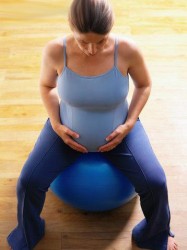By: James N. Martin, Jr, MD
President, The American Congress of Obstetricians and Gynecologists
 It’s no surprise that pregnancy causes many changes to a woman’s body. Extra weight, changing balance, and fatigue can all make sitting on the couch seem a very attractive proposition. But staying active can provide multiple benefits to you and your baby, making pregnancy an excellent time to adopt and stick to an exercise program.
It’s no surprise that pregnancy causes many changes to a woman’s body. Extra weight, changing balance, and fatigue can all make sitting on the couch seem a very attractive proposition. But staying active can provide multiple benefits to you and your baby, making pregnancy an excellent time to adopt and stick to an exercise program.
During pregnancy, exercise can reduce backaches, constipation, bloating, and swelling; boost mood and energy; pro-mote muscle tone, strength, and endurance; and improve sleep quality. It can reduce the risk of gestational diabetes. Pregnant women who exercise may also have an easier time with labor and delivery and weight loss after childbirth.
Talk to your doctor before beginning or continuing an exercise program to be sure that you don’t have any health problems that would limit your activity. Women with certain forms of heart and lung disease, cervical problems, a multiple pregnancy that is at risk of preterm labor, vaginal bleeding, preterm labor, placental problems, and high blood pressure caused by pregnancy (preeclampsia) should avoid exercise. For most pregnant women, however, 30 minutes of moderate intensity exercise on most, if not all, days of the week is recommended.
Be mindful of the changes in your body when choosing your activity. Pregnancy hormones can cause the ligaments that support your joints to stretch and your balance shifts as you gain weight in the front of your body. These changes can lead to more injuries, less stability, and the increased likelihood of falling. The extra weight is also more taxing on your heart. If you can’t talk at normal levels at all times, you may be working too hard.
Gentle exercise such as walking, swimming, cycling, or low-impact or water aerobics is suitable for exercisers of all levels. However, you should avoid any sports or activities that could injure your abdomen or that have a high risk for contact such as ice hockey, soccer, or basketball. Skip activities that come with a high risk of falling such as downhill skiing, horse-back riding, or vigorous racquet sports. Stop exercising and call your doctor if you experience dizziness or faintness, increased shortness of breath, uneven or rapid heartbeat, chest pain, trouble walking, vaginal bleeding, calf pain or swelling, headache, uterine contractions that continue after you rest, fluid gushing or leaking from your vagina, or decreased fetal movement.
Be sure to wear comfortable clothes and a supportive bra and shoes. Drink plenty of water to avoid dehydration and overheating. Most importantly, get out, get moving, and have fun. For more information, the ACOG Patient Education Pamphlet “Exercise during Pregnancy” is available at www.acog.org/publication/patient_education.








